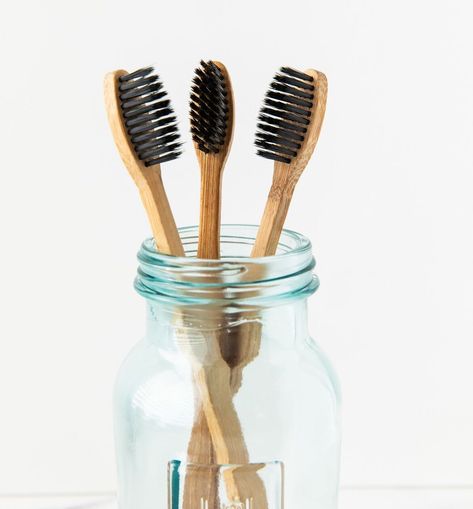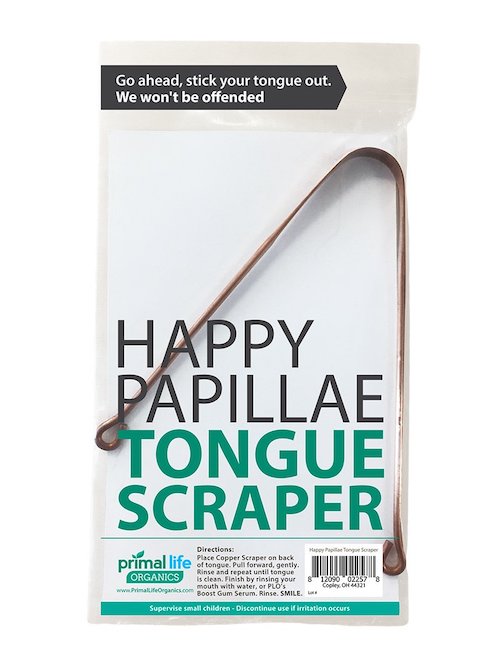“Brush and floss twice a day. Rinse with a mouthwash to remove hidden debris.” We’ve heard a similar mantra for years, and yet, how do we really know if those steps truly prevent cavities, gum disease, and other issues of the mouth? It may be time to change your dental care routine to get a healthy mouth.
Stop Cleaning Your Mouth!
In toothpaste and mouthwash commercials, there is a huge push to “clean the mouth.” But harsh chemical ingredients like alcohol, artificial sugars, artificial colors, SLS, DEA, and fluoride can do more harm than good.
Detoxify the Mouth
Throughout the day, odor-causing bacteria can accumulate in the mouth. This build up is the biggest enemy of a healthy mouth.
Tongue scraping is a traditional Ayurvedic technique that cleans the tongue from the build up of bacteria, fungus, dead cells, and food debris. This technique detoxes the mouth, freshens breath and stimulates metabolism as well. Choose a scraper with a durable and bacteria-resistant copper material to last for long time.
Oil pulling with coconut oil also helps to pull away toxins, and can reduce gingivitis, and cavity-causing bacteria. Simply swish for 10-15 seconds and spit to remove toxins from the mouth.
Hydrate with green tea. The catechins in green tea reduce inflammation and bad bacteria in the mouth, leading to a healthier smile.
Essential oils can be a part of daily dental care routine. Apply essential oils, like diluted clove or peppermint, to the gums or choose an essential oil and activated charcoal imbedded dental floss.
Remineralize the Teeth
Demineralization occurs when the mineral content of the tooth enamel decreases. Demineralization softens enamel, leading to cavities down the line. Once the tooth is demineralized, it is easier for bacteria-laden plaques to penetrate into the center of the tooth where the sensitive root lives. Demineralization must occur before cavities can happen, so avoiding demineralization and using products that specifically remineralize teeth is ideal.
Bonus: A healthy, well-mineralized tooth is a more comfortable tooth. Brushing and flossing are easier, and the tooth has the satisfying smooth, slippery surface inside the mouth.
The primary cause of most tooth demineralization is sugary, acidic beverages. Limiting intake of sodas, juices, and sports drinks can help prevent losing precious minerals.
Brushing with a tooth powder with mineral-rich ingredients, like bentonite and kaolin clay and fulvic acid, allow you to apply minerals directly to the teeth, and have a mild abrasive polishing action as well.
Balance the Microbiome

Inside the mouth are more than 700 different species of bacteria, viruses, protozoa, and fungi. These microbiota play a commensal role in health, aiding in nutrient absorption and warding off harmful pathogens. But when the balance of microbes is off, plaques may form. These plaques meet every definition of a biofilm, and when further challenged by an overloaded or weakened immune system, it can affect both local and systemic health.
There is evidence that artificial sugars like aspartame, xylitol, sorbitol, and erithrytol alter the gut and/or oral microbiome. These common ingredients in toothpastes get mixed reviews. Some studies have shown that xylitol can inhibit bacterial adhesion to the surface of the tooth, but there is also evidence that gut bacteria is significantly altered. Sorbitol alters mouth levels of streptococcus, so it is best to avoid.
Most importantly to the microbiome balance is that you need to avoid mouthwash. The high alcohol content is too harsh on the microbiome and can lead to imbalances.
To optimize the microbial balance in the mouth, avoid:
- SLS
- DEA
- Fluoride
- Triclosan
- Microplastics
- Artificial colors and dyes
- Artificial sugars, and
- Mouthwash
Focus too on getting a diverse mix of probiotics and prebiotics in the diet, staying hydrated, breathing through the nose, and keeping the mouth closed while sleeping.
Alkalinize for a Healthy Mouth
Many tooth products don’t take into account the pH level of the product. This is not good because the normal pH of a healthy mouth is similar to water or blood (about 7.4). If pH drops below 5.5, teeth start to demineralize.
Once again, we see sugary, acidic beverages as the primary cause of high acid (e.g. low pH) in the mouth. If you have to drink juice or soda, be strategic. Consuming the entire beverage in one limited-time sitting is better that sipping slowly throughout the day.
Check of some of my favorite dental care products in this post, or makeover your entire dental routine with this easy kit.



